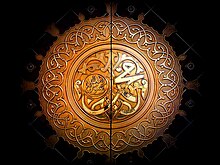**Sources of Biographical Information:**
– The Quran is the central religious text of Islam.
– The Quran provides minimal assistance for Muhammad’s chronological biography.
– Almost none of Muhammad’s companions are mentioned by name in the Quran.
– Early biographies of Muhammad provide additional information about his life.
– Important sources about Muhammad’s life are found in works from the 8th and 9th centuries.
– Traditional Muslim biographies of Muhammad provide additional information.
– The earliest written biography of Muhammad is Ibn Ishaq’s Life of God’s Messenger.
**Quran and Early Biographies:**
– Muslims believe the Quran represents the words of God revealed to Muhammad.
– The Quran is mainly addressed to Muhammad.
– The Quran briefly mentions military encounters.
– The Quran does not provide significant historical context.
– The Birmingham manuscript has been radiocarbon dated to Muhammad’s lifetime.
– Early biographies of Muhammad complement the Quran by providing additional details.
**Hadith and Historical Sources:**
– Hadith collections are accounts of teachings attributed to Muhammad.
– Hadiths were compiled generations after Muhammad’s death.
– Some Western academics view hadith collections cautiously as historical sources.
– Muslim scholars place greater emphasis on hadith literature.
– Hadiths maintain a traditional chain of transmission for verification.
– Al-Waqidi’s history of Muhammad’s campaigns is another early source.
**Pre-Islamic Arabia and Life of Muhammad:**
– The Arabian Peninsula was largely arid with volcanic soil.
– Mecca and Medina were prominent towns and cities.
– Tribal affiliation played a significant role in fostering social unity.
– Indigenous Arabs were either nomadic or sedentary.
– Nomadic survival depended on raiding caravans or oases.
– Muhammad’s early life, his marriage to Khadijah, and his leadership within the Quraysh tribe.
**Muhammad’s Early Life and Challenges:**
– Muhammad’s birth, upbringing, and marriage to Khadijah.
– Muhammad’s encounters in his early life, including with the Christian monk Bahira.
– Muhammad’s involvement in trade and his role in the reconstruction of the Kaaba.
– Quranic revelations received by Muhammad in the cave of Hira.
– Opposition faced by Muhammad in Mecca, including persecution and attempts to stop his preaching.
Muhammad (Arabic: مُحَمَّد, romanized: Muḥammad; English: /moʊˈhɑːməd/; Arabic: [mʊˈħæm.mæd]; c. 570 – 8 June 632 CE) was an Arab religious, social, and political leader and the founder of Islam. According to Islamic doctrine, he was a prophet divinely inspired to preach and confirm the monotheistic teachings of Adam, Abraham, Moses, Jesus, and other prophets. He is believed to be the Seal of the Prophets within Islam, with the Quran as well as his teachings and practices forming the basis for Islamic religious belief.
Muhammad | |
|---|---|
مُحَمَّد | |
 | |
| Personal | |
| Born | c. 570 CE (53 BH) Mecca, Hejaz, Arabia |
| Died | 8 June 632 CE (11 AH; aged 61–62) Medina, Hejaz, Arabia |
| Resting place | Green Dome at the Prophet's Mosque, Medina, Arabia 24°28′03″N 39°36′41″E / 24.46750°N 39.61139°E |
| Spouse | See Wives of Muhammad |
| Children | See Children of Muhammad |
| Parents |
|
| Known for | Establishing Islam |
| Other names |
|
| Relatives |
|
| Arabic name | |
| Personal (Ism) | Muḥammad مُحَمَّد |
| Patronymic (Nasab) | Ibn ʿAbd Allāh ibn ʿAbd al-Muṭṭalib ibn Hāshim ibn ʿAbd Manāf ibn Quṣayy ibn Kilāb ٱبْن عَبْد ٱللَّٰه بْن عَبْد ٱلْمُطَّلِب بْن هَاشِم بْن عَبْد مَنَاف بْن قُصَيّ بْن كِلَاب |
| Teknonymic (Kunya) | Abū al-Qāsim أَبُو ٱلْقَاسِم |
| Epithet (Laqab) | Khātam al-Nabiyyīn ('Seal of the Prophets') خَاتَم ٱلنَّبِيِّين |
Muhammad was born in approximately 570 CE in Mecca. He was the son of Abdullah ibn Abd al-Muttalib and Amina bint Wahb. His father, Abdullah, the son of Quraysh tribal leader Abd al-Muttalib ibn Hashim, died around the time Muhammad was born. His mother Amina died when he was six, leaving Muhammad an orphan. He was raised under the care of his grandfather, Abd al-Muttalib, and paternal uncle, Abu Talib. In later years, he would periodically seclude himself in a mountain cave named Hira for several nights of prayer. When he was 40, circa 610 CE, Muhammad reported being visited by Gabriel in the cave and receiving his first revelation from God. In 613, Muhammad started preaching these revelations publicly, proclaiming that "God is One", that complete "submission" (islām) to God (Allah) is the right way of life (dīn), and that he was a prophet and messenger of God, similar to the other prophets in Islam.
Muhammad's followers were initially few in number, and experienced hostility from Meccan polytheists for 13 years. To escape ongoing persecution, he sent some of his followers to Abyssinia in 615, before he and his followers migrated from Mecca to Medina (then known as Yathrib) later in 622. This event, the Hijrah, marks the beginning of the Islamic calendar, also known as the Hijri calendar. In Medina, Muhammad united the tribes under the Constitution of Medina. In December 629, after eight years of intermittent fighting with Meccan tribes, Muhammad gathered an army of 10,000 Muslim converts and marched on the city of Mecca. The conquest went largely uncontested, and Muhammad seized the city with little bloodshed. In 632, a few months after returning from the Farewell Pilgrimage, he fell ill and died. By the time of his death, most of the Arabian Peninsula had converted to Islam.
The revelations (ayat) that Muhammad reported receiving until his death form the verses of the Quran, regarded by Muslims as the verbatim "Word of God" on which the religion is based. Besides the Quran, Muhammad's teachings and practices (sunnah), found in transmitted reports (hadith) and in his biography (sīrah), are also upheld and used as sources of Islamic law.
